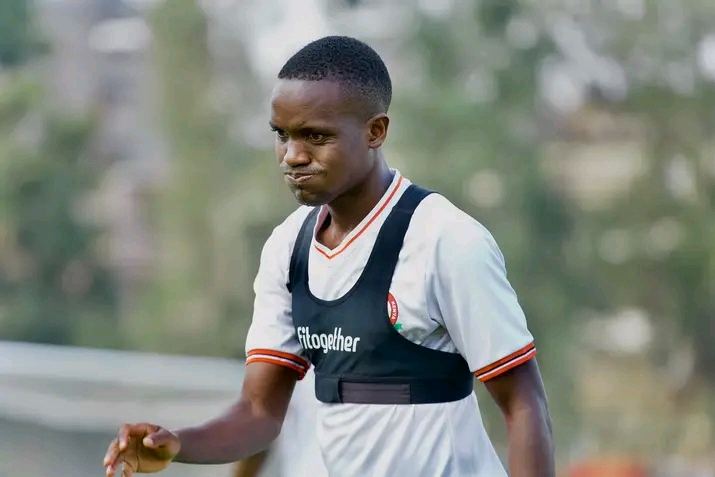

In Aleles village, Amagoro, Busia county, the wind hums a new song. A song carried by the dust, carried by memory, carried by the feet of a boy who once played barefoot on gravel, chasing dreams stitched from nylon and leather.
His name is Boniface Muchiri — the man whose right boot now writes verses of Busia’s rising football dream.
Born in Busia, his first canvas was the stony fields of primary school. Teachers saw light in his feet. Villagers whispered of destiny.
His fire grew at St. Mary’s Kibabii Boys, where the headmaster, Peter Lunani, became a shepherd of talent. Lunani stretched out his hand, leading him into the arms of Nzoia Sugar FC.
Fate, as if restless, pulled him again. Six months later, he wore the badge of Sony Sugar, and then the yellow of Tusker FC, where under the stern eye of Robert Matano, the boy became a man.
The American Gamble
When the world froze under the breath of Covid-19, Muchiri’s compass pointed west. He boarded a plane heavy with hope, crossing the Atlantic to find a new rhythm at La Force FC in the third division of U.S. football.
But America gave him both gift and wound. Injuries clipped his wings, pressing pause on the dream. He limped, but he refused to fall. "I knew pain would not last. I believed in tomorrow," he recalls, his voice calm, soldierly.
Tomorrow led him home. Home to the fatigues of the Kenya Defence Forces. Home to the badge of Ulinzi Stars.
For three seasons, he became fire incarnate — goals pouring from his boots, discipline guiding his play, his name etched atop scorers’ charts.
The Call of the Nation
Tusker had gifted him his first international football passport. Spain. Morocco. Training camps where he wore the Harambee Stars jersey tight on his chest, a second skin of pride and burden.
And in the stands, one heart beat louder than the rest. His mother, Mildred Akinyi, her prayers floating like incense across the pitch. "Fear was in me as I watched him. But I prayed every moment. He has always played with a warrior’s heart," she says.
Her son, the soldier-striker, knows her hand carved his destiny. "My mother has been my foundation. Everything I am comes from her sacrifices. When I received the millions from CHAN 2024, my first thought was to change her life. She deserves it," he vows.
Balancing Books and Boots
Muchiri was never just a ball boy. With a C+ in his final exams, university beckoned. He secured admission to Rongo University in Migori County. But football sang louder. The Kenya Defence Forces answered his spirit, fusing two loyalties — to the flag and the game.
"I train every day. I bond with teammates. That is my strength," he says, voice steady as a drill sergeant. It is this rhythm of discipline that made him a soldier and striker in one breath.
Family, Faith, and Fire
Yet beneath the medals and jerseys lies the pulse of family. His younger brother, Alvin Emerikwa, a striker for Thunderbirds FC, fuels his flame.
"Boniface is more than a brother. He is my mirror. Every time he scores, I feel it too. He lifts us all higher," Alvin says.
For Muchiri, blood is the truest anthem. His mother’s prayers, his brother’s shadow, his family’s hopes — all lace his boots before battle.
Away from the pitch, Private Muchiri turns pages of scripture. Catholic hymns steady his heart. His Bible is a lantern in darkness, and his faith, a helmet. "Before every game, I kneel. I whisper to God. Without Him, I am nothing," he admits.
The Road to CHAN 2024
And now, as the drums of CHAN 2024 thunder, Busia waits with bated breath. In smoky kiosks, where radios crackle, in crowded market stalls where televisions flicker, every pass, every tackle, every strike from Muchiri becomes a collective heartbeat.
For Aleles, this tournament is not just football. It is testimony. It is proof that a barefoot boy, once chasing balls of plastic, can walk into legend. His mother’s pride spills like river water.
"I see God’s hand in him. Boniface is my answered prayer. I only ask that he remain humble," she whispers.
And his brother, Alvin, adds fire to the chorus: "Busia will never be the same. He has opened doors for us all."
Muchiri knows he carries more than his weight. He carries a village, a county, a mother’s prayer, a brother’s dream, a nation’s hunger. In Aleles, children now lace their boots tightly. They call his name between goalposts fashioned from sticks. They believe.
Beyond the Game
But the striker is not blind to tomorrow. The millions from CHAN 2024 are not for vanity. They are for his mother. They are for building a new house, a new life, a thank-you stitched in stone and a roof. "My mother’s life will change. That is my vow," Muchiri says.
His mother smiles softly, tears edging her eyes. "That boy is my gift. I raised him with little, but today he gives me the world," she murmurs.
The Soldier Who Became a Poem
Muchiri is no longer just a player. He is a poem sung on the lips of Busia. He is a promise stitched in the red of the flag and the green of the field. From the dust of Aleles to the lights of CHAN 2024, his right boot has carried him into legend.

















